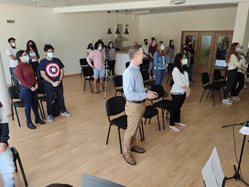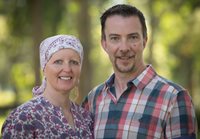Comunidade Pedras Vivas (CPV) is a church plant which began in the city of Porto, Portugal in January 2014 with a vision to make disciples who will make disciples. Starting a church from scratch has many challenges, but as I began to think about what CPV has been learning about sharing the good news during Covid-19, I realised that starting from scratch has prepared us to deal with the current situation.
Building on contacts
CPV has never focused on church-based outreach programs and initiatives. In our context, where there is scepticism and suspicion about Christ focused, Bible-based churches, invitations to “come in” just do not work. In our context, sharing the good news is done most effectively through informal daily conversations. We intentionally seek to build relationships with those we live among and encourage those who are part of CPV to do the same.
Consequently, CPV does not have a busy weekly schedule of church-based activities and so the main impact of Covid-19 on CPV’s week was that, like many in PCI, we moved to an online Sunday service and a midweek virtual prayer meeting. In terms of sharing the good news, Covid-19 meant that the sphere of our daily conversations was restricted to existing contacts.
Conversations crying out for gospel answers
Daily conversations provide an important glimpse into another person’s life, revealing what they think, are concerned about, longing for or struggling with. I imagine that the only real difference between the daily conversations of recent weeks and months in Portugal and those in Ireland has been the language. I have heard people share grave concerns for the health of family members close by or far away; express anxiety about financial security as the economy struggles and jobs are lost; voice disappointment with political leaders who appear removed and detached from the actual situation; praise and thank those who have put themselves at risk for the wellbeing of others; grumble and murmur about unfulfilled plans and hopes in such unstable times.
Think for a minute about some of these topics – concern about health and illness (even death), anxiety, disappointment, blame, thankfulness, grumbling and confusion. Each conversation topic crying out for real and solid answers. Current daily conversations are fertile ground for sharing the good news of hope, grace, sacrifice, peace, and love. Well, at least we think so. But how are we to engage in such conversations?
Questions that take others deeper
Several years ago, I came across a book called Questioning Evangelism by Randy Newman. Randy worked as an evangelist on a university campus and was frustrated by the apathy and disinterest of the students with whom he attempted to share the good news. He went back to the gospels to learn from Jesus and noticed how often Jesus engaged people with questions. He tried this method on the university campus and has been using it ever since. His thesis is that questions allow us to probe the thinking of those we chat with, ensuring that we answer their actual questions rather than answer what we feel they ought to be asking.
Questions also help those we chat with to probe their own thinking, exposing doubts or flaws that they may not have thought of before. Covid-19 has raised many issues and gentle probing with our own simple direct questions - “why do you say that?”, “how do you make sense of what is happening at the minute?”, “has faith been a factor for you recently?” - can tease out these issues providing opportunities for us to respond by sharing the good news.
Sensitivity, confidence and patience
As we seek to share the good news, taking advantage of the daily conversations around us at this challenging time, there are three attitudes it is good to keep in mind.
Firstly, we ought to be sensitive. We need to be sensitive to the Spirit of God through prayer so that as we listen to the words being spoken to us, we are able to hear the concerns, hopes, disappointments and needs being expressed, and then be enabled to bring gospel answers. Covid-19 has deeply challenged many people’s sense of security bringing genuine fears to the surface and so we also need to be sensitive in our conversations by showing empathy, understanding and loving concern.
Secondly, we ought to be confident. Covid-19 has spread rapidly not discriminating on the basis of race, age, sex or social status. The main source of hope for many people is the growing confidence that a vaccine will be produced in due course. The arrival of a vaccine will indeed be good news. However, as disciples of Jesus, our hope and confidence lie in the historical facts of the birth, death, and resurrection of Jesus. This really is the good news, eternally good news. We need to believe it, live by it, and share it with confidence.
 Then we need to be patient. A few weeks ago, I got a call from a friend here in Portugal who was clearly concerned and fearful about all that Covid-19 meant. We have known each other for a few years now, catching up from time to time as we are able. As we explored these fears, there was a great opportunity to speak clearly and directly to my friend about the gospel. There have been numerous ‘seeds’ dropped into past conversations, but this was the first time I sensed such openness to hear and listen. I share this simply to show the need to be patient in the daily conversations we cultivate.
Then we need to be patient. A few weeks ago, I got a call from a friend here in Portugal who was clearly concerned and fearful about all that Covid-19 meant. We have known each other for a few years now, catching up from time to time as we are able. As we explored these fears, there was a great opportunity to speak clearly and directly to my friend about the gospel. There have been numerous ‘seeds’ dropped into past conversations, but this was the first time I sensed such openness to hear and listen. I share this simply to show the need to be patient in the daily conversations we cultivate.
CPV returned to public worship at the beginning of June. It has been good to see people together again. There have also been a few new faces. Some found us via our YouTube channel during lockdown. But one new face is the result of the sensitive, confident and patient engagement of a member of CPV with his work colleague as they talked together each day. These conversations continue and through them, this disciple is seeking to make another disciple.
 James Cochrane is a Global Mission Worker in Portugal with his wife Heather. You can read more about their work and witness here.
James Cochrane is a Global Mission Worker in Portugal with his wife Heather. You can read more about their work and witness here.
This blog is part of a wider series under the campaign, These Three Remain to help members and congregations during the Coronavirus pandemic.
Visit the These Three Remain hub here.